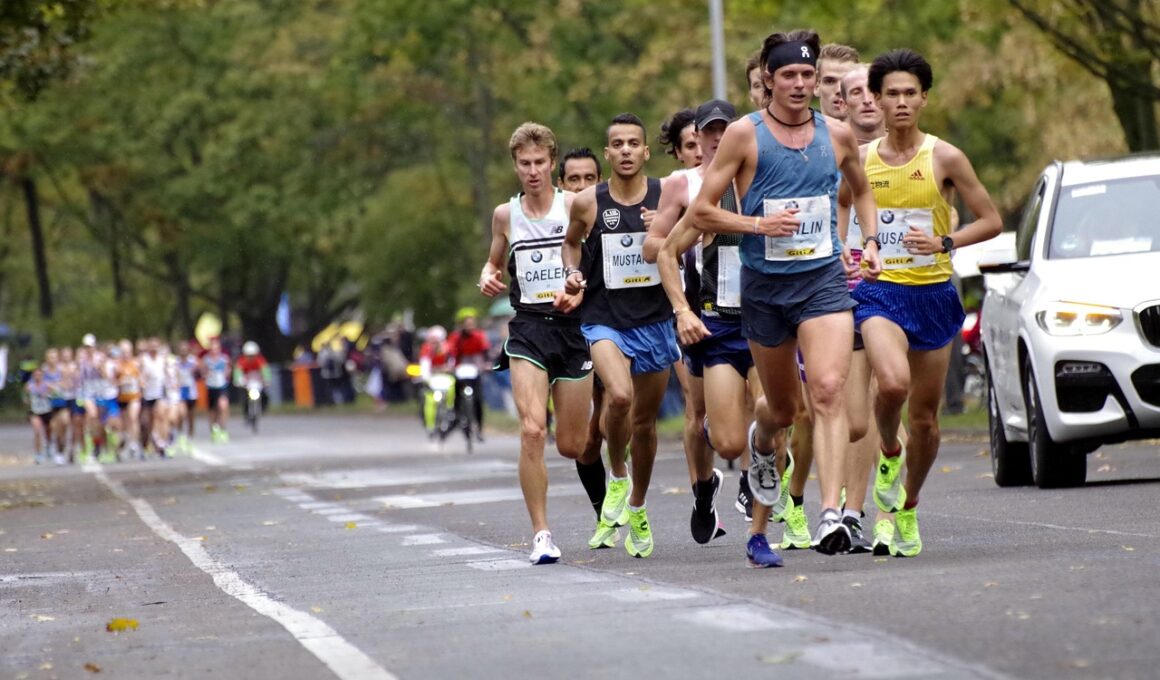Mental Strategies to Push Through the ‘Wall’ in Endurance Events
Endurance events can be mentally and physically grueling. Many athletes experience a phenomenon known as “the wall,” which refers to that moment when fatigue overwhelms and motivation wavers. Understanding this aspect is crucial for athletes looking to enhance performance. Developing effective mental strategies to overcome this barrier can lead to improved resilience. By focusing on mental tactics, athletes can train their minds just as intensively as their bodies. Strategies such as positive self-talk, visualization, and goal setting become critical during those exhausting times. Incorporating these techniques into training not only prepares the mind for the race but creates a beneficial cycle of mental strength. Competitors should recognize that while the body may feel like quitting, the mind has incredible capabilities to push beyond perceived limits. Using these methods consistently during practice can improve muscle memory, creating a stronger response during events. Athletes must also remember that overcoming the wall is often a shared experience; it is common and can be tackled together with team support. Ultimately, it’s about finding personal mental tools that work for each individual, setting the foundation for future successes.
Positive Self-Talk
Positive self-talk is an impactful technique that endurance athletes can utilize when facing challenging moments. This mental strategy involves consciously replacing negative thoughts with constructive affirmations. During intense physical exertion, athletes might feel overwhelmed, and this is when their internal dialogue can start to wane. Instead of focusing on fatigue, athletes must remind themselves of their strengths, achievements, and capabilities. Phrases such as “I am strong,” “I can do this,” or even “One step at a time” can help shift the mindset toward perseverance. Regular practice of positive self-talk during training builds a resilient mental framework to draw upon during competitions. Athletes should ideally develop a set of phrases that resonate personally, making them feel empowered and determined. Repeating these affirmations mentally or out loud can reinforce a positive outlook, often translating into improved physical performance. It is essential to train the mind to foster this inner dialogue daily. Concentrating on an optimistic mindset boosts confidence and combats feelings of doubt when struggling against physical barriers. Overcoming the wall becomes a part of the journey learned through positive reinforcement.
Visualization is another potent tool for endurance athletes seeking to enhance their performance. This technique involves mentally picturing success and the process of overcoming obstacles faced during events. Athletes can use this visualization technique both in practice and restful periods to build a powerful mental image of achievement. Whether it’s visualizing crossing the finish line or picturing themselves pushing past the wall, creating vivid images can lead to a stronger connection with their physical capabilities. Research has shown that athletes who regularly practice visualization tend to achieve better outcomes. The process encourages a mental rehearsal of future events, preparing them for the actual experience. Athletes should strive to make these visualizations as detailed as possible, including emotions and sensations experienced during the event. By immersing themselves in this mental space, they can create an emotional memory that assists in real-life scenarios. With consistent application, visualization fosters a confident mindset, nurturing resilience. This leads to improved performance when athletes face challenges like fatigue or self-doubt, as they feel more capable and prepared. Ultimately, it’s about tailoring this technique for personal effectiveness.
Goal Setting
Goal setting is an essential mental strategy to enhance performance for endurance athletes. This approach involves defining clear, attainable objectives that pave the way for ongoing improvement. By setting specific, measurable goals, athletes can create structured paths to success. Breaking long-distance challenges into smaller milestones allows for a more manageable focus, promoting motivation and accomplishment. These smaller goals can include incremental increases in distance or time, which sustain the athlete’s engagement. Furthermore, having clear performance goals helps to foster a sense of direction and purpose, especially when fatigue sets in during events. Implementing a reward system for achieving these milestones maintains motivation levels throughout the training cycle. Regularly revisiting and adjusting these goals is vital as well, ensuring they evolve with the athlete’s growth. In fostering this growth mentality, athletes set themselves up for continuous improvement and learning opportunities. Tracking progress is also beneficial, as it provides tangible proof of development, reinforcing the emotional resolve needed to push through challenging moments. Ultimately, effective goal setting empowers athletes, enhancing their capacity to overcome the wall and expand their limits over time.
Mindfulness and breathing techniques can significantly improve an athlete’s ability to cope during endurance events. By focusing on their breath and becoming aware of the present moment, athletes can cultivate a calmer mental state. Implementing mindfulness practices helps athletes acknowledge the physical sensations without judgment. This state of awareness reduces anxiety and prevents overwhelming feelings that often contribute to hitting the wall. Practicing controlled breathing techniques during training reinforces comfort in applying them during competition. This method shifts attention away from pain or discomfort, connecting the mind with the body harmoniously. A few deep breaths can create an internal focus, grounding the athlete when perseverance seems difficult. Establishing a mindful approach adds an essential layer of mental resilience, allowing athletes to embrace the journey without succumbing to negativity. The importance of practicing mindfulness consistently cannot be overstated; through time, it fosters a positive mental framework that can be called upon in critical moments. Ultimately, the training of the mind through mindfulness contributes to a more robust overall performance, enhancing the enjoyment and experience of endurance events.
Role of Support Systems
Having a robust support system is fundamental for endurance athletes tackling the mental challenge of events. This system can include coaches, teammates, friends, and family who provide encouragement and motivation. The importance of social support cannot be underestimated; it offers athletes a sense of belonging, reduces feelings of isolation, and enhances motivation levels. Sharing experiences with peers creates camaraderie and reinforces the understanding that challenges are collective struggles. Engaging in team activities fosters unity and shared goals, pushing each other to achieve fantastic results. Encouragement from others, especially during difficult moments, can help athletes find strength they never knew they had. Additionally, support from coaches provides critical insights into training, addressing mental strategies and overcoming barriers. Emotional resilience often grows from collaborative efforts, emphasizing the significance of this network. Athletes should not shy away from leaning on their support systems; it is a crucial part of the process. Building these relationships can also alleviate pressures felt when facing the wall. Ultimately, intertwining personal and communal efforts can be a powerful antidote to mental fatigue, enhancing performance.
Finally, developing a growth mindset is essential when facing challenges in endurance sports. This philosophy focuses on the belief that skills and abilities can be cultivated through effort and dedication. Athletes must embrace challenges as opportunities for growth rather than setbacks. When encountering obstacles, maintaining a positive outlook reinforces perseverance and resilience. It encourages viewing endurance events, not just as competitions but as platforms for improvement and self-discovery. This mindset allows athletes to cope better when fatigue sets in and promotes constant learning from each experience. Realizing that failure is part of the growth process aids in managing expectations and fosters long-term progress. Cultivating a growth mindset also translates into other areas of life, as it shapes a person’s approach to challenges outside of athletics. Athletes should be encouraged to celebrate small victories, driving motivation further. Over time, this perspective nurtures a lifelong habit of striving for excellence, regardless of immediate results. Adopting such a mindset is invaluable, as it encourages an enduring passion for the sport and personal well-being, ultimately reinforcing the journey towards conquering the wall.
Conclusion
In conclusion, embracing mental strategies is essential for endurance athletes confronting significant challenges. Techniques including positive self-talk, visualization, goal setting, mindfulness, social support, and cultivating a growth mindset incrementally build mental resilience. Each method intertwines, offering various angles for athletes to tap into during moments of doubt or exhaustion. Practicing these strategies consistently in training leads to improved mental preparedness in competition settings. Overcoming the wall is not only about physical capability; the mental component plays a critical role. When athletes learn to harness their inner strength alongside physical endurance, they create a powerful synergy that drives performance. Ultimately, it’s about establishing personal connections through various strategies and finding what resonates best with individual needs. A supportive network can enhance this journey, ensuring that athletes feel grounded and empowered. By integrating these strategies into their routines and fostering a mindset centered on growth, athletes can face challenges, maximize performance, and enjoy the experience fully. As mental fortitude becomes a focal point of endurance training, athletes will increasingly discover they have the power to overcome the wall and achieve their goals.


